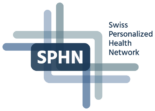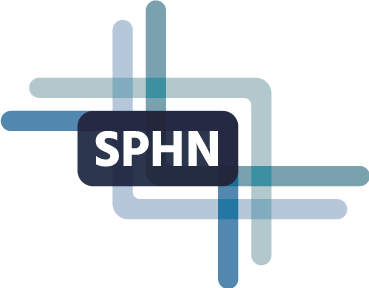Data Coordination Center (DCC)
The SPHN Data Coordination Center (DCC) operated by the Personalized Health Informatics Group of the SIB Swiss Institute of Bioinformatics is responsible for the coordination and for the technical implementation of key milestones of the SPHN initiative, as well as for promoting harmonization efforts and process innovation throughout the Swiss health-data ecosystem.
The DCC is further mandated to promote the development and implementation of nationwide standards for data semantics and exchange mechanisms in order to reach the interoperability goals of the initiative. The DCC closely collaborates with the University Hospitals and other data providers, various expert working groups and task forces, and the BioMedIT network partners. Further, the DCC takes a lead on education and training across the network, as well as providing helpdesk functions regarding technical as well as ELSI matters that arise in the community.
DCC Areas of Activity
Cross-Institutional Collaboration
The DCC is the coordination and contact point for all SPHN funded projects and infrastructures, and promotes and supports cross-institutional collaborations throughout the country. It interfaces between all SPHN stakeholders (including, but not limited to, data providers, data producers and researchers etc.) with regards to technical, interoperability and health-data governance issues. In collaboration with SPHN and BioMedIT expert working groups and task forces, bringing together subject specialists from the various stakeholder and partner institutions across Switzerland, the DCC produces blueprints, guidelines and policies for the responsible use and exchange of health-related data in SPHN and beyond.
Infrastructure Implementation
Health data-sharing infrastructures encompass not only necessary IT components but also resources, competences and related services. While the DCC supports research infrastructure implementation activities throughout SPHN (e.g. in the University Hospitals, in collaboration with PHRT technology centers, and in the realm of the BioMedIT network), it is responsible for the implementation of several central components in relation to the FAIRification of data (i.e. make them Findable, Accessible, Interoperable, and Re-usable), and with regard to the secure transfer, storage and use of sensitive research data.
Data Privacy & IT Security & ELSI
Dealing with sensitive health-related information, data protection and IT security are of paramount importance and at the core of SPHN and BioMedIT. Together with the BioMedIT nodes and security experts, the DCC safeguards that developments in relation to BioMedIT fulfil the highest standards to ensure ethical and legal compliance. In addition, the DCC in collaboration with SIB, node representatives and security experts is responsible for the maintenance of the SPHN Information Security Policy. In support of the ELSI efforts of the initiative, the DCC fosters a harmonized data governance strategy and a consistent legal and regulatory framework throughout the network. The DCC supports researchers with regard to ELSI questions and needs. Moreover, it develops guidelines for the de-identification of health-related data in compliance with Swiss legal and data protection regulations.
Data Standards and Semantic Interoperability
In collaboration with its partners, the DCC builds a Semantic Web based framework and a FAIR Data Tool Stack to make Data FAIR (Findable, Accessible, Interoperable and Re-usable). This framework builds on a strong semantic layer, using controlled vocabulary and international references as well as a graph-based representation of the data in RDF. The framework aims to ensure that information can be interpreted consistently by both, machines and people - across projects, systems, countries and time.
Metadata Catalogues and Feasibility Tools
To improve the findability of health-related data, the DCC supports the cataloging of metadata into appropriate directories. An example is the implementation of the SPHN Cohort Consortium Network on the Maelstrom metadata catalog, which provides general information on the cohorts and querying of the catalogued variables. Another example is the SPHN Metadata Catalogue, which contains information about selected SPHN projects' datasets and their data elements. The Metadata Catalogs uses international standards like the dcat vocabulary and the FAIR data point specification.
In addition, a federated distributed query system for feasibility studies is being deployed in all five University Hospitals, in order to enable researchers to design and optimize study protocols. All patient-related data stays in the hospitals in de-identified form, only aggregated query results (patient counts) are reported to researchers via this system for study planning purposes.
BioMedIT Central Services and Technical Interoperability
Given the sensitive nature of health-related information, research using patient data calls for high levels of security and data protection in Information and Communication Technology (ICT) infrastructures, processes and expertise, in order to fulfil stringent legal, regulatory and ethical requirements. The key challenge here is to provide researchers with an integrated solution. The PHI group in close collaboration with the network partners has setup the BioMedIT network as part of SPHN to provide all authorized researchers in Switzerland with easy access to collaborative analysis of confidential data without compromising data privacy. Under the umbrella of the DCC, the PHI group operates a central service layer and is responsible for the coordination as well as the management and direction of the implementation of the BioMedIT Network project.

Training and Information
The SPHN Training series was launched in 2021, featuring tutorials and demonstrations on topics from the responsible use of health-related data for research, FAIR health-related data, and research using sensitive data in BioMedIT.
The DCC also runs the SPHN Webinar series to present and align on the achievements of the SPHN-funded projects and other expert know-how relevant to the vision and mandate of SPHN. As the SPHN initiative advances on its mission to develop, implement and validate coordinated data infrastructures in order to make health-relevant data interoperable and shareable for research in Switzerland, these seminars are a great opportunity to learn from each other, ask questions and leverage expert know-how from the research community.

